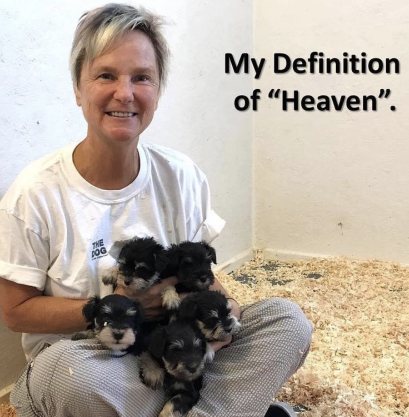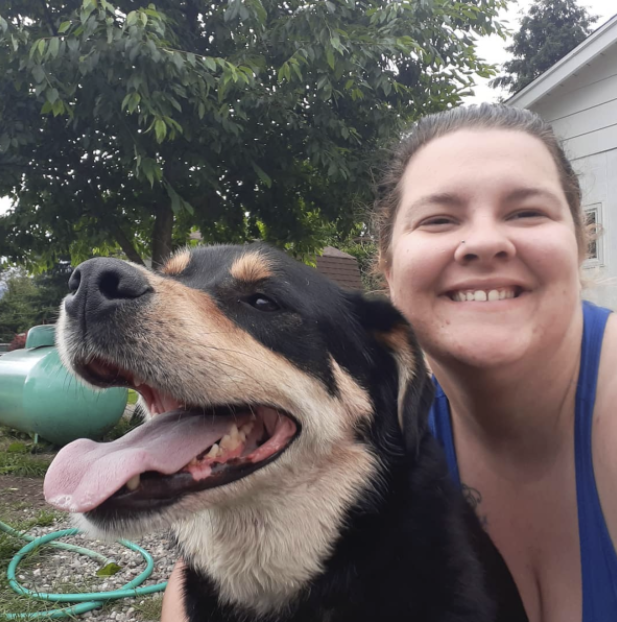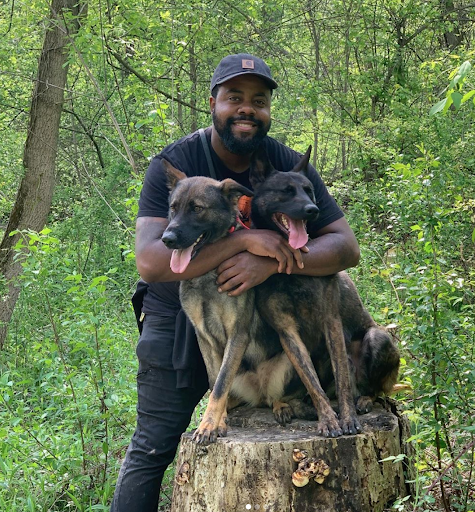
Steve Liggens
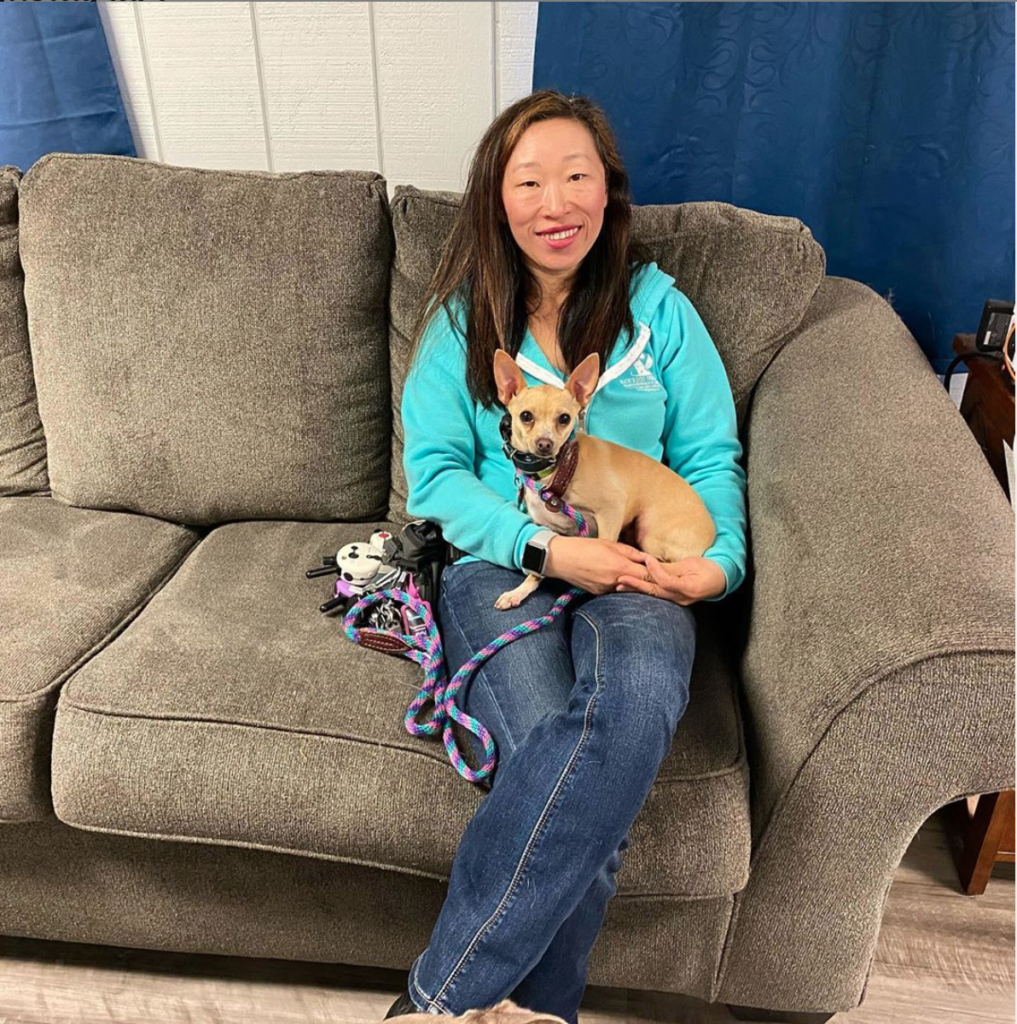 19k
19k
It’s expanding, which I love. It allows me to do pretty much everything within one tool, which I appreciate. As a business owner, it is helpful to have one source, to be able to handle a multitude of items without having to manage 10 or 12 different platforms.
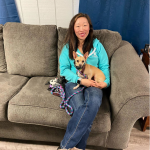
Nicole Buck
PocketSuite Dog Trainer Pro
Dog Training Pro Nicole Buck is Owner and Head Dog Trainer of Buck’s Dog Training in New Jersey. Her psychology background and her persistence make her a great asset to our PocketSuite Pro community. Nicole talks to Managing Editor and CEO, Chinwe Onyeagoro about her time in the corporate world, being a minority, and woman working mostly in a male-dominated industry, and how it led to starting her own dog training business.
Could you talk to us about what you do and how you got started?
I am running a dog training business. I’ve done this for probably about five years now. I did it kind of as a side business for almost 20 years because I used to be in corporate sales, working for companies like AT&T. Then I decided that I had enough of the corporate world. I was always good with dogs, and I love dogs, and I figured I would try to branch out and start my own company. I’ve always wanted to have my own business, be my own boss, and create a friendly and hardworking company that didn’t depend on corporate politics to get ahead and promote yourself. Hence why I started my company.
So it’s been about five years now. I just hired three new trainers. So I’m up to nine trainers now. I’m trying to do less of the training part and more of the business aspect, promotion, marketing, sales, and eventually franchising.
You’re not the first pro that we’ve talked to that left corporate. It’s becoming a trend now. How did you go about doing that? Were your friends and family supportive?
Some of my friends were incredibly supportive and others questioned me like, “Are you insane? You’re giving up a six-figure salary to do what?” So, I got the whole gamut of “Yes, we’re behind you a 100%” to, “You’re crazy. You’re never going to make it.” But at the end of the day, they were going to do anything they could to help me, which I did appreciate, even if they thought I was crazy.
How did you push through? What advice would you give to others?
One is you have to have the fortitude and the passion for doing something. And then the patience and persistence. In my case, stubbornness to continue through, no matter what the odds. If you have a passion for it, and it’s something that you want to make sure that you can give absolutely everything to, you have to go for it because if it’s that much of a drive within you, how can you not? You know it does take a lot of dedication. I had no life for the first three and a half years because my entire life was the business. Getting it up and running, trying to make money, hustling like crazy, pounding the pavement, doing everything that I learned from the corporate world, and applying it to an individual business where I’m the only person. I’m the only one that I can depend on. That was a little scary.
How do you define success during that early period? Because money is not the thing, right?
It’s not money. For me, It was about creating the right relationship between an owner and their dog. I was all about promoting the right type of relationship because there are too many people out there who get a dog for the wrong reasons. They don’t invest in their animal and the commitment that they’ve made. Next thing you know, the animal is in a shelter. So to me, it was easily fixed with just a little bit of training. If I could get one less animal turned into a shelter, I felt like I was making at least a minimal impact. Then if I could get them to enjoy their dog and the relationships they have with that animal, that was, to me, the ultimate level of an impact that I wanted to try and make. So, in the early days, that was how I measured my success. I mean the money, once it started to roll in was very helpful. I was doing two and three different jobs, plus trying to get the business off the ground. I was stretched thin, but I had to do what I needed to do to pay the bills and then still pursue my passion. For the 1st three to four years, it was all hustle and no personal time.What is the tipping point between, “I got to be my own boss, and I’m willing to face the fact that I may fail, and I may have no money, and I may have to start from scratch.” Is it just such a love of dogs in your case that you couldn’t imagine doing anything else?
It was more than that. It’s the reason why I chose that particular avenue to go down—being in the corporate world, being a minority, and woman working mostly in a male-dominated industry because telecommunications was about 90% male-dominated. It was challenging to navigate through the politics. There was a lot to overcome and many barriers to break down in that world. I got tired of trying to always prove myself and be better than everybody else. It’s not just better than the top person. It’s just like you’ve got to be better than all the women. You’ve got to be better than all the men. And you’re still not treated equally. It got very frustrating. There was no real career opportunity beyond a certain point in that corporate world without really giving up your entire life. I wasn’t willing to do that.
Do you think it’s still like that?
It was like that when I left, only five years ago.
I would echo that. I had the same experience in the corporate world. I think there’s a likeability factor that goes beyond just being your authentic self. You have to sort of cater to whoever is in charge at a level where you start to feel like you’re losing a part of yourself.
Exactly.
How would you explain to someone who hasn’t been an entrepreneur the difference between that relationship cultivation as a business owner and the politics in the corporate world? One might confuse them because you’re still trying to build that relationship and reach out. But it’s different.
Whenever I’m dealing with clients and even my trainers, I deal with them how I would want to be treated versus what some policy handed down from some C level executive is telling me. Whether it makes sense or not, I’m a very practical type of person. I’m very common sense oriented, but I’m also very customer-focused. Many policies are not customer first in the corporate world because it’s all about the bottom line and the bottom dollar. You can’t approach customers with that mindset because it just leaves a bad taste in their mouths and you lose customer loyalty. So I have a lot more flexibility from an entrepreneur standpoint than I ever did from a corporate perspective.I try and foster that same mentality and attitude with all of my trainers, so they have a lot of flexibility. I can’t stress enough with them, the customer first. Don’t ever make the customer feel cheated. Don’t ever do anything in the best interest of yourself. Always think of the customer first. It’s going to be hard because you know, you have to make money and you’ve got bills and everything else. Often, you approach things from a very centric point of view, self-centered, what’s in it for me, I have to make this money. It’s like, as soon as you do that, you’ve just lost your customer because they can sense that.
Was working with dogs a business combined with a hobby or just a lifelong passion?
I’m very practical. It was more business combined with a passion. I knew I had the passion. I’ve always loved animals. I still prefer to be with my dogs than with people. From a business perspective, I also know that it’s people who pay my bills, who have the money to pay for the training. So you have to cultivate that relationship as well. I have confidence in my business skills, in my skillset as far as sales, running a business, controlling costs just from being in the business world, and knowing how to operate the cost of goods and things of that nature. I had calculated out a lot of that stuff before figuring out what avenue I wanted to take with my own business.
What other businesses did you consider, or did you?
I had considered food, catering, or opening a restaurant, but when you consider the overhead costs of all those things, and also the fact that restaurants tend to fail fairly quickly, I didn’t think it would be a viable enough business venture. It’s a little too risky.
Can you tell us a little bit about your training system for dogs? How is it different? And when clients say, “Oh my gosh, you’ve transformed my relationship.” What is it that they’re talking about?
I have a psychology background, so I utilize four quadrants of learning when I do my training. Many trainers focus on only the one quadrant, which is positive only. There is no such thing as positive only, but you’ll have 90% of the trainers out there saying, “Oh, we do positive-only training.” I try to educate people. There’s no such thing as positive only training because as soon as you withhold something, you’re adding a negative. As soon as you say the word, “No,” you’re adding a negative. As soon as you use any pressure, whether it be leash or holding the dog, you’re adding a negative. So there is no such thing as positive-only training. So I try to teach people the most effective way to train a dog or any animal is to use all four quadrants, both positive and negative, for both reinforcements, as well as punishment.Those are scientific terms—punishment, meaning just removing something, and reinforcement, meaning increasing something or adding something. So we use both positive and negative to either increase the behavior or decrease the behavior. The way we do that is to add something or take something away, which is what it comes down to. That’s a very simplistic explanation. There are millions of nuances that we go over as we do the actual training, but that’s it at a fundamental level.
Due to COVID there is a huge resurgence in people getting dogs, people wanting companionship, people needing emotional support. Would you say now is an excellent time to get into your industry?
It is an incredibly hard industry to succeed in. It’s easy to start a business because there’s no real legislation, unfortunately. So you have a lot of people out there who are not qualified to train dogs and they’re messing them up and the owners, but if you do it right, it is incredibly hard work. That’s what I tell all of my trainers that I hire. “First, you have to love dogs because there’s going to come a time,” and I 100% guarantee it to every single trainer that comes to work for me, “there will come a time where you will hate your job. You will hate dogs. You will call me and say, I quit because I can’t take it anymore.” I tell them, “I will guarantee at some point, while you’re working for me, you will do that” because it is incredibly hard, you have those days where the dog is just peeing and pooping. You’re cleaning up pee and poop like five times a day from three different dogs. It’s just a crap show and no one wants to deal with that. But that’s part of the job. It is what we have to do. It’s not a glamorous job. I try and instill in my trainers, “This is not an easy job. It’s great. We get to play with dogs. That’s all well and good.” But then you have the not so great part of the job where they’re particularly stubborn, or they’re trying to bite you, or they’re peeing all over. One thing or another is happening. That’s all part of the job too.
You also board dogs while training them. I’ve always wondered how you then help them make the transition back so the dog parent can grab hold of those teachings and those results and maintain them?
That’s why we use tools. So we have what we call E-collars. It’s an electronic collar and it goes around the dog’s neck. It has a tone like a beeping sound, then it has a vibration, which we use for deaf dogs because they can’t hear the beep. It’s like a pulsing sensation. If you’ve ever gone to a chiropractor or physical therapist, it’s the same thing. It just sends a little pulsation and it slightly contracts the muscle. It’s enough to get the dog’s attention, but it doesn’t harm them or hurt them. It’s just enough to interrupt their focus and then have them refocus on you. We utilize that as part of the training tool to teach the dog a particular behavior pattern. They hear the tone and they know there’s a command. Suppose they don’t follow us through after they already know how to do the commands? We’ll spend hours working on repetitions, using treats, and other positive ways to get the dog to understand what the command is. Then once they know it and they’re just stubborn, we start to layer in that correction, that little bit of negative reactivity like, “Okay, you’re not doing what I’m asking. So now there’s going to be a little bit of a consequence. It’s not going to be horrific. It’s just going to be annoying. All right, you’re going to feel this pulse until you finally give me what I asked for because you know what it is, you’re just stubborn.”Because we pattern that behavior, once we hand the dog back, we teach the owner here’s what you need to do. Just hit this button here. It’s a tone. The dog knows if he doesn’t listen, you hit this other button. It’s just as simple as that. We try to make it as easy as possible when we transition them back. We have to put the work in upfront. We have to get the dog to understand if you don’t do the command after the tone, there’s going to be a consequence, and it’s going to be very mild. But there is a consequence.
Has your job been impacted by COVID?
Luckily with our facility, we have enough space to practice social distancing and maintain everything safely wearing masks and conducting our business. Because of COVID and all the job losses and everything else, it had an impact on our business because people don’t have the money to invest in training, that’s a luxury, and it’s not always something that people are willing to do until they have a steady income again.
It seems to me, as long as the human race embraces canines as their companion of choice, your chosen vocation is a good one. We’re always going to need dog trainers.
I would hope so. I mean, people are getting more and more intelligent. Hopefully, they will not get any less lazy because we love lazy people. After all, they want to hire us to do their job.
Can you create an app to train your dog?
There are a lot of free videos. We could probably come up with an app, but unfortunately, if people don’t do the work, no app will fix that. You have to put in the time. Many people don’t have the time, nor do they want to put in the time. That’s why in some regards, yes, we have some job security because of that. But as more and more people enter into this business, it’s going to take a big chunk of that.You have to put in the time. Many people don’t have the time, nor do they want to put in the time. That’s why in some regards, yes, we have some job security because of that. But as more and more people enter into this business, it’s going to take a big chunk of that.
The dog training industry is full of solopreneurs, who are one trainer and one dog. You’re unique in that you’re growing and scaling beyond powered by me to powered by us. What was the point for you as it relates to deciding to say, “Hey, actually, I want to build a larger business, something bigger than myself.” What’s your vision for what you’d like to see in the future?
I always knew it would be more than just me because when it was just me, I was building up even within the first year more business than I could only handle myself. I always knew I was going to have at least something outside of just me. To be sustainable for me as a business and not be completely tired out. I knew I would have to develop a business model where I would work smarter, not harder. So, hence why I was looking at franchising opportunities. That’s ultimately the route that I chose because it’s a type of dog training that I can efficiently train and pass on to other trainers to build their locations, utilizing my methods. I decided that that would probably be the easiest and smartest way to propagate my business.
Do you have the mentality that since you’ve been successful in corporate environments, you can take this new industry to the very top? Also, you have a background in psychology, I’ve always wondered how different human and dog psychology is because we’ve ultimately trained dogs to respond and think like us to a certain extent. Within that, what is something that you’ve learned from dogs? A lesson taught to you?
I think people who have been in that big corporate environment tend to gravitate towards a larger scale operation once they go solo, just because they have seen it, they know it. They can envision something, maybe not quite as big, but something bigger than just a solo operation, ultimately for themselves. At least for me, that was always the case. I was never going to be just a sole operation. I always knew I would have my own business, have people working under me, and eventually go national and international.As far as the dog aspects and humans, dogs are by far easier to train than humans. They’re so much less complicated. With dogs, you give them a particular stimulus or a specific set of instructions, rules, and you know how to handle them. They will follow through. It is just straightforward, easy, cut, and dry. Not that you won’t get your stubborn dogs, but I know how to deal with them. There’s a very prescribed formula that works almost a 100% of the time with dogs, with humans, not so much. Humans have multiple layers to deal with.
Have you learned to live in the moment? Have you learned to love unconditionally? You must have learned something from the dogs?
I’ve learned that I can appreciate people more, especially if they are dog lovers because usually, people who love dogs have some redeeming character about them. But I can’t say there’s like one particular thing that I’ve learned, specifically from a dog. I love and appreciate them. And the fact that they do love unconditionally, except for Siberians, they are very conditional about their love. It’s all about them.
A final message for the PocketSuite Community?
Just pursue your dreams, do it with dedication, do it with passion, and do it intelligently. Do your research, make sure you know what you’re getting into, and then give it everything you have. Whether you make a success of it or whether you fail. There is no real failure because you’re always learning something, and you take what you’ve learned and make it better the next time.
For people who haven’t used PocketSuite at all, any story that gives them a picture of the experience PocketSuite has helped deliver for you?
I will say it is probably the most versatile tool that I’ve used. It’s expanding, which I love. It allows me to do pretty much everything within one tool, which I appreciate. As a business owner, it is helpful to have one source, to be able to handle a multitude of items without having to manage 10 or 12 different platforms.
Thank you so much, Nicole.


